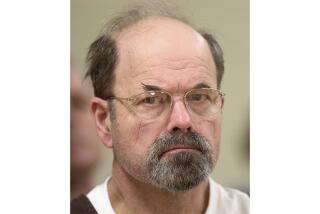Conflict of Interest Forces Second Mistrial in Rader Murder Case
- Share via
The second murder trial of British national Harvey Rader, who is charged with the deaths of a missing Northridge family, ended in a mistrial Thursday after the Los Angeles County public defender’s office discovered it was representing an important prosecution witness as well as Rader.
Prosecutors said they will seek a third trial as quickly as possible.
Los Angeles Superior Court Judge Judith C. Chirlin, who declared the mistrial Thursday morning and will preside over any retrial, now must appoint a publicly paid private attorney to represent Rader in order to avoid the conflict of interest. The judge said she expects to make that appointment within a week.
Rader’s first trial ended without a verdict last Aug. 31 after the jury deadlocked with one juror holding out for acquittal.
Rader, 47, who has steadfastly claimed he is innocent, became a suspect shortly after the disappearance in 1982 of Sol Salomon, his wife, Elaine, and their two children, Michalle, 15, and Mitchell, 9.
Deputy Dist. Atty. Lonnie A. Felker, who likens his case to “the pieces of a jigsaw puzzle” of circumstantial evidence, claims Sol Salomon had a business relationship with Rader, a one-time Reseda auto dealer, that soured.
Rader was arrested in 1983 after his cousin, Ashley Paulle, told authorities that Rader killed the Salomons and that he had been an accomplice.
The district attorney’s office gave Paulle immunity in return for his testimony against Rader, but later revoked the immunity and tried to prosecute Paulle, too. A Los Angeles court threw out the case against Paulle, saying the immunity had been improperly revoked, and Paulle has since returned to his native London.
On Tuesday, the day before testimony began in Rader’s second trial, Felker noted that prosecution witness Robert Williams had been sentenced to state prison for felony driving under the influence, asking if he could provide civilian clothes for the witness when he appeared in court.
In the first trial, Williams, an auto detailer, testified that he found blood in the trunk of Rader’s Rolls Royce when Rader brought it in for work. Williams said Rader told him the blood was from animals he had killed on a hunting trip.
By Wednesday afternoon, Deputy Public Defender Mark D. Lessem determined, by checking Williams’ case number through office computers, that his office had represented Williams when he pleaded guilty on the drunk driving offense and was sentenced last week.
A court official said computers usually cross-check defendants’ names so lawyers in the same office can avoid representing people with conflicting interests, but are not programmed to turn up conflicts involving witnesses .
After meeting with his superiors, Lessem first asked the prosecutor not to call Williams as a witness. But Felker refused, saying Williams was important to his case.
Lessem then asked Chirlin to order that Williams be excluded on grounds his testimony would only repeat that of other witnesses. But, after reading transcripts from the 1989 trial Wednesday night, the judge refused.
Lessem said he was then forced to declare a conflict of interest on behalf of his office. The prosecutor opposed the move, saying he saw no conflict since Lessem had not personally handled or even known about the Williams drunk-driving case.
Exploring another option, the judge asked lawyers if Rader and the witness might waive the apparent conflict of interest. But Lessem said the public defender’s office has a strict policy against asking clients to do that.
The judge then declared a conflict and obtained Rader’s agreement to a mistrial so that a new lawyer can be appointed and familiarize himself with the estimated 8,000 pages of transcript from the first trial and another 8,000 pages of investigative reports.
Felker said he was “disappointed” by the second mistrial and delay, but remains confident he can prove his case.
Lessem, who has represented Rader for 15 months and appeared upset about having to bow out of the case, refused to comment.
Rader will remain in custody without bail pending a new trial.
More to Read
Sign up for Essential California
The most important California stories and recommendations in your inbox every morning.
You may occasionally receive promotional content from the Los Angeles Times.











